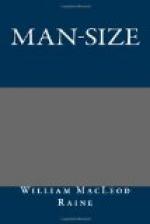Cuffy was a prince of leaders. He seemed to know by some sixth sense the best way to wind through underbrush and over swamps. He was master of the train and ruled by strength and courage as well as intelligence. Bull had ideas of his own, but after one sharp brush with Cuffy, from which he had emerged ruffled and bleeding, the native dog relinquished claim to dominance.
The travelers made about fifteen miles before noon. They came to a solitary tepee, built on the edge of a lake with a background of snow-burdened spruce. This lodge was constructed of poles arranged cone-shaped side by side, the chinks between plastered with moss wedged in to fill every crevice. A thin wisp of smoke rose from an open space in the top.
At the sound of the yelping dogs a man lifted the moose-skin curtain that served as a door. He was an old and wrinkled Cree. His face was so brown and tough and netted with seams that it resembled a piece of alligator leather. From out of it peered two very small bright eyes.
“Ugh! Ugh!” he grunted.
This appeared to be all the English that he knew. Beresford tried him in French and discovered he had a smattering of it. After a good many attempts, the soldier found that he had seen no white man with a dog-train in many moons. The Cree lived there alone, it appeared, and trapped for a living. Why he was separated from all his kin and tribal relations the young Canadian could not find out at the time. Later he learned that the old fellow was an outcast because he had once shown the white feather in a battle with Blackfeet fifty years earlier.
Before they left, the travelers discovered that he knew two more words of English. One was rum, the other tobacco. He begged for both. They left him a half-foot of tobacco. The scant supply of whiskey they had brought was for an emergency.
Just before night fell, Morse shot two ptarmigan in the woods. These made a welcome addition to their usual fare.
Though both the men were experienced in the use of snowshoes, their feet were raw from the chafing of the thongs. Before the camp-fire they greased the sore places with tallow. In a few days the irritation due to the webs would disappear and the leg muscles brought into service by this new and steady shuffle would harden and grow fit.
They had built a wind-break of brush beside the sled and covered the ground with spruce boughs after clearing away the snow. Here they rested after supper, drying socks, duffles, and moccasins, which were wet with perspiration, before the popping fire.
Beresford pulled out his English briar pipe and Tom one picked from the Company stock. Smoke wreathed their heads while they lounged indolently on the spruce bed and occasionally exchanged a remark. They knew each other well enough for long silences. When they talked, it was because they had something to say.
The Canadian looked at his friend’s new gun-case and remarked with a gleam in his eye:




